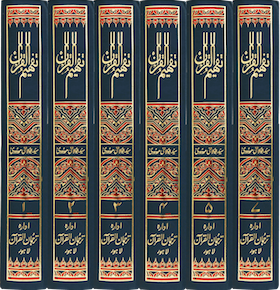Tafhim-ul-Quran
1972 Islamic commentary by Sayyid Abul Ala Maududi From Wikipedia, the free encyclopedia
Tafhim-ul-Quran (Urdu: تفہيم القرآن, romanized: Tafheem-ul-Quran, lit. 'Towards Understanding the Qur'an') is a 6-volume translation and commentary of the Qur'an by the Pakistani Islamist ideologue and activist Syed Abul Ala Maududi. Maududi began writing the book in 1942[1] and completed it in 1972.[2][3]
This article has multiple issues. Please help improve it or discuss these issues on the talk page. (Learn how and when to remove these messages)
|
 Set of 6 volumes | |
| Author | Abul A'la Maududi |
|---|---|
| Genre |
|
| Published | 1946 - 1972 |
| Publisher | Idara Tarjuman ul Qur'an, Lahore |
| Website | tafheemulquran |
Tafhim is derived from the Arabic word fahm which means "understanding".[4] Tafhim-ul-Quran is a combination of orthodox and modernist interpretation. It discusses economics, sociology, history, and politics. In his text, Maududi highlights Quranic perspective and says that Islam provides ample guidance in all spheres.
Maududi uses the standard technique of providing an explanation of the Qur'anic verses from the Sunnah of Muhammad, including the historical reasons behind the verses.
The Tafhim deals extensively with issues faced by the modern world in general and the Muslim community in particular.[5]
Maududi wrote his work in Urdu. It has since been translated to languages including English, Hindi, Bengali, Malayalam, Marathi, Pashto and Sindhi. In 2006, the Islamic Foundation published an abridged one-volume English translation by Zafar Ishaq Ansari under the title Towards Understanding the Qur'an.
References
External links
Wikiwand - on
Seamless Wikipedia browsing. On steroids.
